Ethics in Counselling: Frameworks, Challenges, and Values
VerifiedAdded on 2022/08/24
|11
|2747
|15
Essay
AI Summary
This essay provides a comprehensive analysis of ethics in counselling, emphasizing the importance of ethical frameworks and the challenges counsellors face. It explores the concepts of ethics, ethical frameworks, and the significance of values in counselling practices. The essay delves into specific ethical challenges related to counsellors' values, such as navigating situations involving violent or disturbed clients, and balancing the principles of beneficence, non-maleficence, and justice. It examines the impact of personal values on ethical decision-making, highlighting how these values can sometimes limit adherence to ethical principles. The analysis draws on various sources, including the BACP Ethical Framework, to illustrate the complexities of ethical dilemmas and the importance of considering multiple perspectives in counselling practices. The essay underscores the need for counsellors to act in the best interest of their clients while adhering to professional codes and legal requirements.
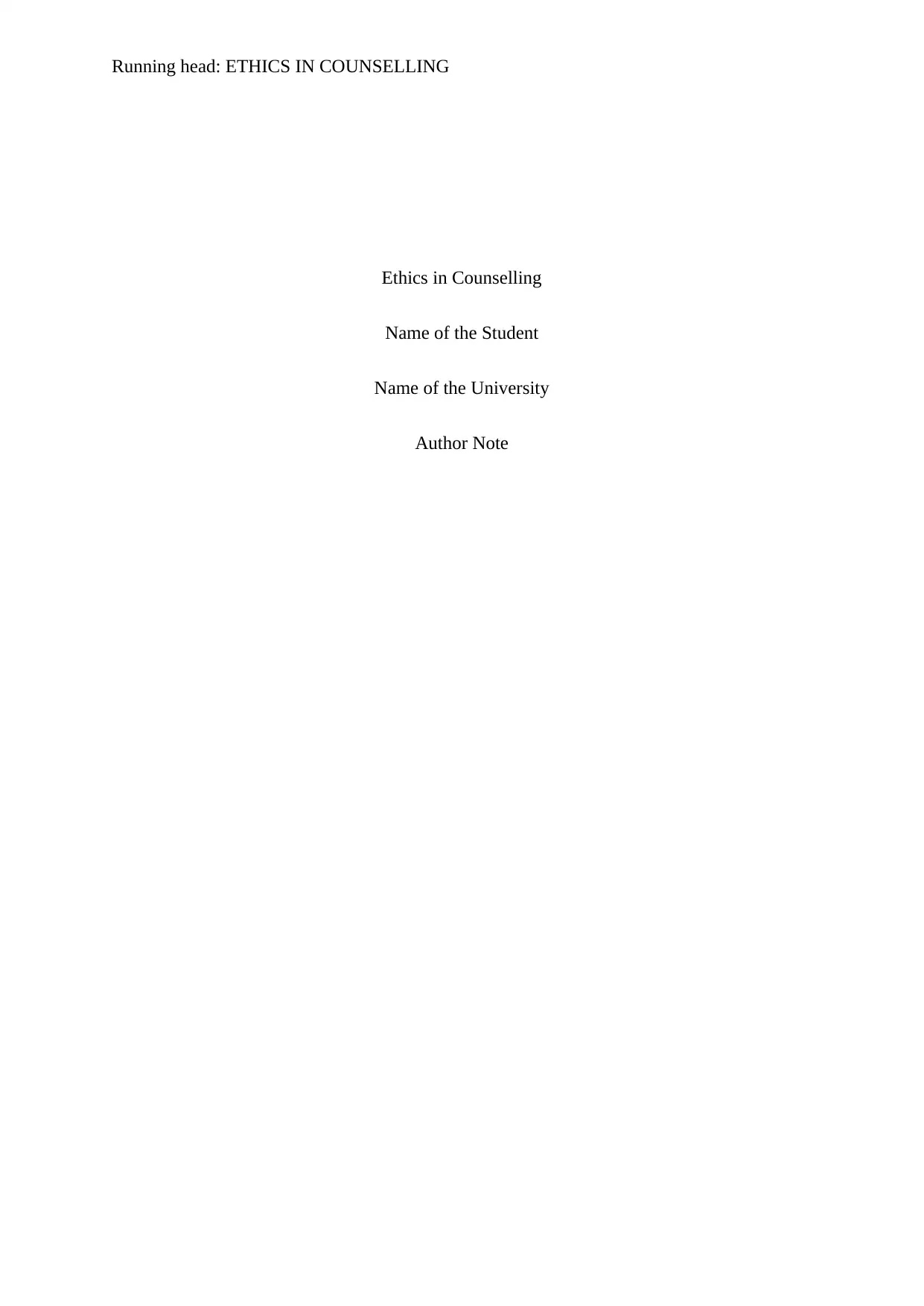
Running head: ETHICS IN COUNSELLING
Ethics in Counselling
Name of the Student
Name of the University
Author Note
Ethics in Counselling
Name of the Student
Name of the University
Author Note
Paraphrase This Document
Need a fresh take? Get an instant paraphrase of this document with our AI Paraphraser
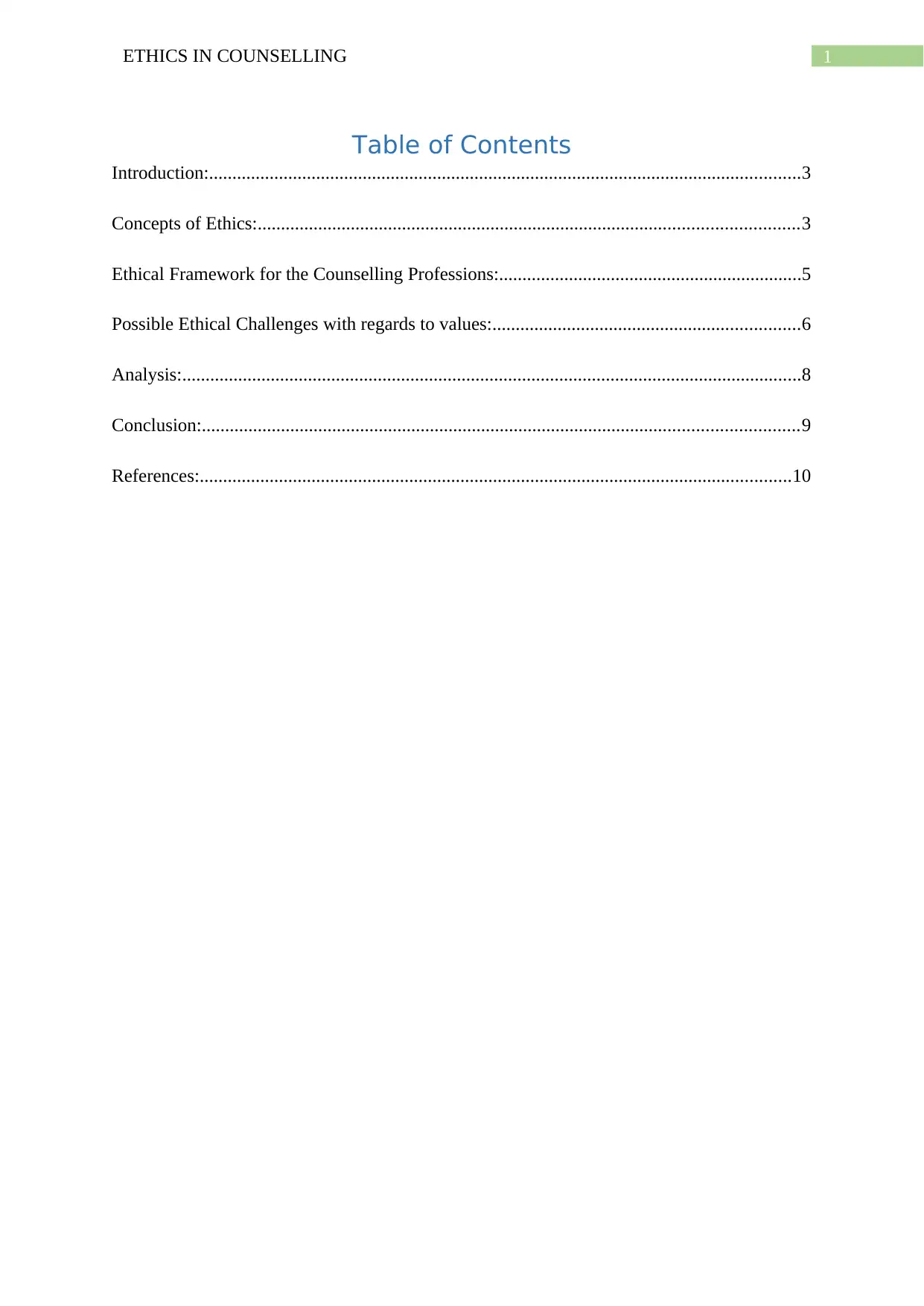
1ETHICS IN COUNSELLING
Table of Contents
Introduction:...............................................................................................................................3
Concepts of Ethics:....................................................................................................................3
Ethical Framework for the Counselling Professions:.................................................................5
Possible Ethical Challenges with regards to values:..................................................................6
Analysis:.....................................................................................................................................8
Conclusion:................................................................................................................................9
References:...............................................................................................................................10
Table of Contents
Introduction:...............................................................................................................................3
Concepts of Ethics:....................................................................................................................3
Ethical Framework for the Counselling Professions:.................................................................5
Possible Ethical Challenges with regards to values:..................................................................6
Analysis:.....................................................................................................................................8
Conclusion:................................................................................................................................9
References:...............................................................................................................................10
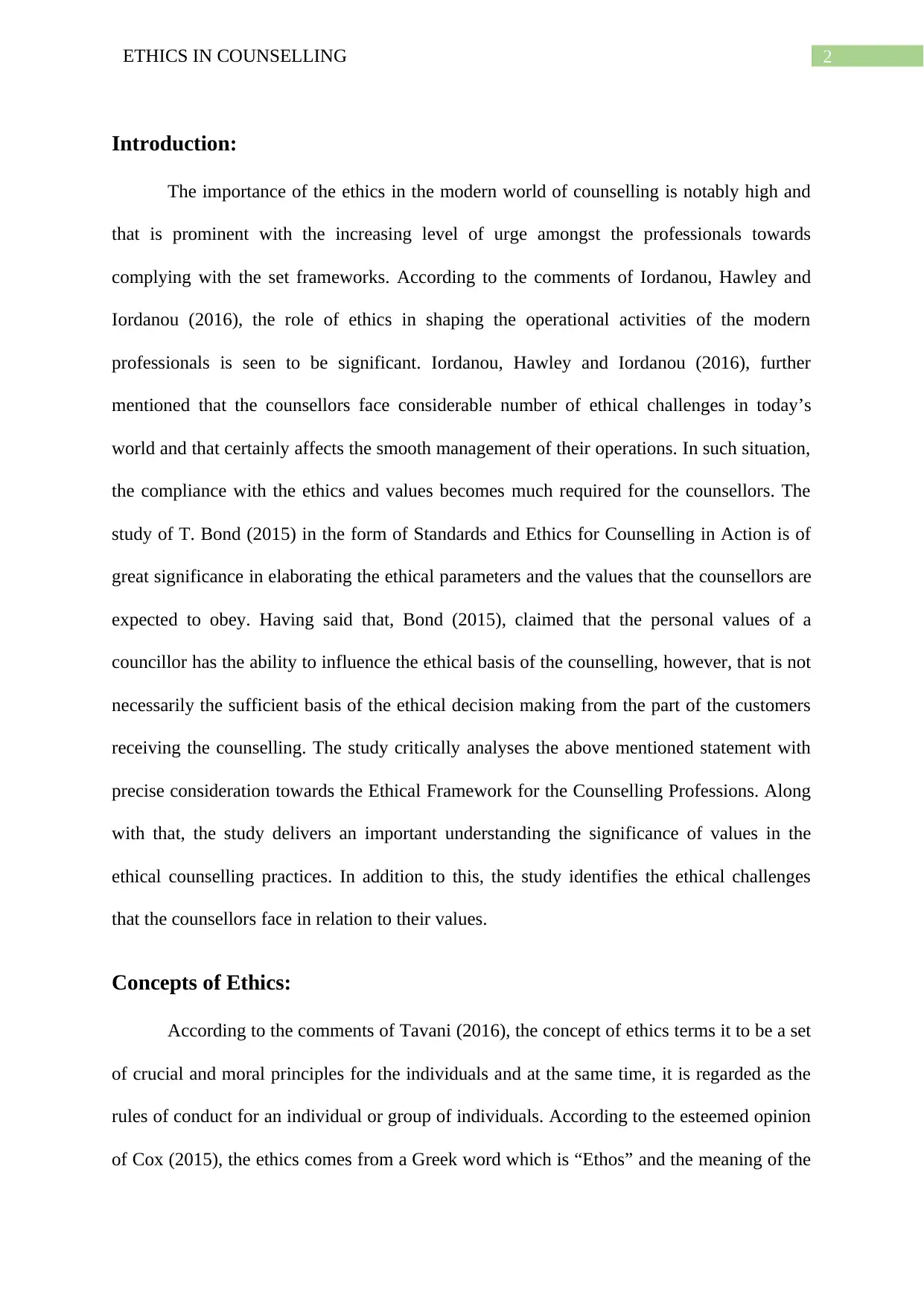
2ETHICS IN COUNSELLING
Introduction:
The importance of the ethics in the modern world of counselling is notably high and
that is prominent with the increasing level of urge amongst the professionals towards
complying with the set frameworks. According to the comments of Iordanou, Hawley and
Iordanou (2016), the role of ethics in shaping the operational activities of the modern
professionals is seen to be significant. Iordanou, Hawley and Iordanou (2016), further
mentioned that the counsellors face considerable number of ethical challenges in today’s
world and that certainly affects the smooth management of their operations. In such situation,
the compliance with the ethics and values becomes much required for the counsellors. The
study of T. Bond (2015) in the form of Standards and Ethics for Counselling in Action is of
great significance in elaborating the ethical parameters and the values that the counsellors are
expected to obey. Having said that, Bond (2015), claimed that the personal values of a
councillor has the ability to influence the ethical basis of the counselling, however, that is not
necessarily the sufficient basis of the ethical decision making from the part of the customers
receiving the counselling. The study critically analyses the above mentioned statement with
precise consideration towards the Ethical Framework for the Counselling Professions. Along
with that, the study delivers an important understanding the significance of values in the
ethical counselling practices. In addition to this, the study identifies the ethical challenges
that the counsellors face in relation to their values.
Concepts of Ethics:
According to the comments of Tavani (2016), the concept of ethics terms it to be a set
of crucial and moral principles for the individuals and at the same time, it is regarded as the
rules of conduct for an individual or group of individuals. According to the esteemed opinion
of Cox (2015), the ethics comes from a Greek word which is “Ethos” and the meaning of the
Introduction:
The importance of the ethics in the modern world of counselling is notably high and
that is prominent with the increasing level of urge amongst the professionals towards
complying with the set frameworks. According to the comments of Iordanou, Hawley and
Iordanou (2016), the role of ethics in shaping the operational activities of the modern
professionals is seen to be significant. Iordanou, Hawley and Iordanou (2016), further
mentioned that the counsellors face considerable number of ethical challenges in today’s
world and that certainly affects the smooth management of their operations. In such situation,
the compliance with the ethics and values becomes much required for the counsellors. The
study of T. Bond (2015) in the form of Standards and Ethics for Counselling in Action is of
great significance in elaborating the ethical parameters and the values that the counsellors are
expected to obey. Having said that, Bond (2015), claimed that the personal values of a
councillor has the ability to influence the ethical basis of the counselling, however, that is not
necessarily the sufficient basis of the ethical decision making from the part of the customers
receiving the counselling. The study critically analyses the above mentioned statement with
precise consideration towards the Ethical Framework for the Counselling Professions. Along
with that, the study delivers an important understanding the significance of values in the
ethical counselling practices. In addition to this, the study identifies the ethical challenges
that the counsellors face in relation to their values.
Concepts of Ethics:
According to the comments of Tavani (2016), the concept of ethics terms it to be a set
of crucial and moral principles for the individuals and at the same time, it is regarded as the
rules of conduct for an individual or group of individuals. According to the esteemed opinion
of Cox (2015), the ethics comes from a Greek word which is “Ethos” and the meaning of the
⊘ This is a preview!⊘
Do you want full access?
Subscribe today to unlock all pages.

Trusted by 1+ million students worldwide
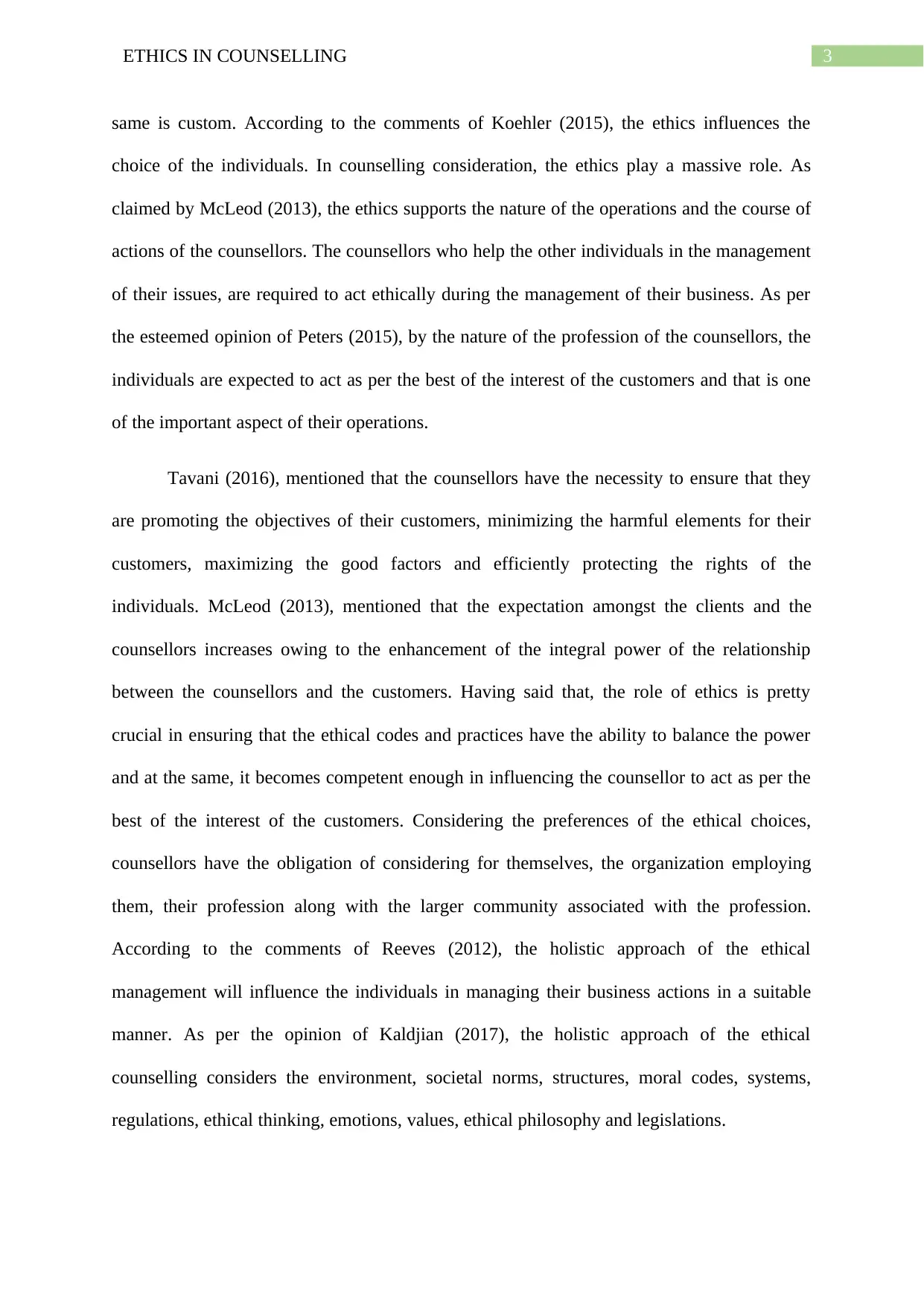
3ETHICS IN COUNSELLING
same is custom. According to the comments of Koehler (2015), the ethics influences the
choice of the individuals. In counselling consideration, the ethics play a massive role. As
claimed by McLeod (2013), the ethics supports the nature of the operations and the course of
actions of the counsellors. The counsellors who help the other individuals in the management
of their issues, are required to act ethically during the management of their business. As per
the esteemed opinion of Peters (2015), by the nature of the profession of the counsellors, the
individuals are expected to act as per the best of the interest of the customers and that is one
of the important aspect of their operations.
Tavani (2016), mentioned that the counsellors have the necessity to ensure that they
are promoting the objectives of their customers, minimizing the harmful elements for their
customers, maximizing the good factors and efficiently protecting the rights of the
individuals. McLeod (2013), mentioned that the expectation amongst the clients and the
counsellors increases owing to the enhancement of the integral power of the relationship
between the counsellors and the customers. Having said that, the role of ethics is pretty
crucial in ensuring that the ethical codes and practices have the ability to balance the power
and at the same, it becomes competent enough in influencing the counsellor to act as per the
best of the interest of the customers. Considering the preferences of the ethical choices,
counsellors have the obligation of considering for themselves, the organization employing
them, their profession along with the larger community associated with the profession.
According to the comments of Reeves (2012), the holistic approach of the ethical
management will influence the individuals in managing their business actions in a suitable
manner. As per the opinion of Kaldjian (2017), the holistic approach of the ethical
counselling considers the environment, societal norms, structures, moral codes, systems,
regulations, ethical thinking, emotions, values, ethical philosophy and legislations.
same is custom. According to the comments of Koehler (2015), the ethics influences the
choice of the individuals. In counselling consideration, the ethics play a massive role. As
claimed by McLeod (2013), the ethics supports the nature of the operations and the course of
actions of the counsellors. The counsellors who help the other individuals in the management
of their issues, are required to act ethically during the management of their business. As per
the esteemed opinion of Peters (2015), by the nature of the profession of the counsellors, the
individuals are expected to act as per the best of the interest of the customers and that is one
of the important aspect of their operations.
Tavani (2016), mentioned that the counsellors have the necessity to ensure that they
are promoting the objectives of their customers, minimizing the harmful elements for their
customers, maximizing the good factors and efficiently protecting the rights of the
individuals. McLeod (2013), mentioned that the expectation amongst the clients and the
counsellors increases owing to the enhancement of the integral power of the relationship
between the counsellors and the customers. Having said that, the role of ethics is pretty
crucial in ensuring that the ethical codes and practices have the ability to balance the power
and at the same, it becomes competent enough in influencing the counsellor to act as per the
best of the interest of the customers. Considering the preferences of the ethical choices,
counsellors have the obligation of considering for themselves, the organization employing
them, their profession along with the larger community associated with the profession.
According to the comments of Reeves (2012), the holistic approach of the ethical
management will influence the individuals in managing their business actions in a suitable
manner. As per the opinion of Kaldjian (2017), the holistic approach of the ethical
counselling considers the environment, societal norms, structures, moral codes, systems,
regulations, ethical thinking, emotions, values, ethical philosophy and legislations.
Paraphrase This Document
Need a fresh take? Get an instant paraphrase of this document with our AI Paraphraser
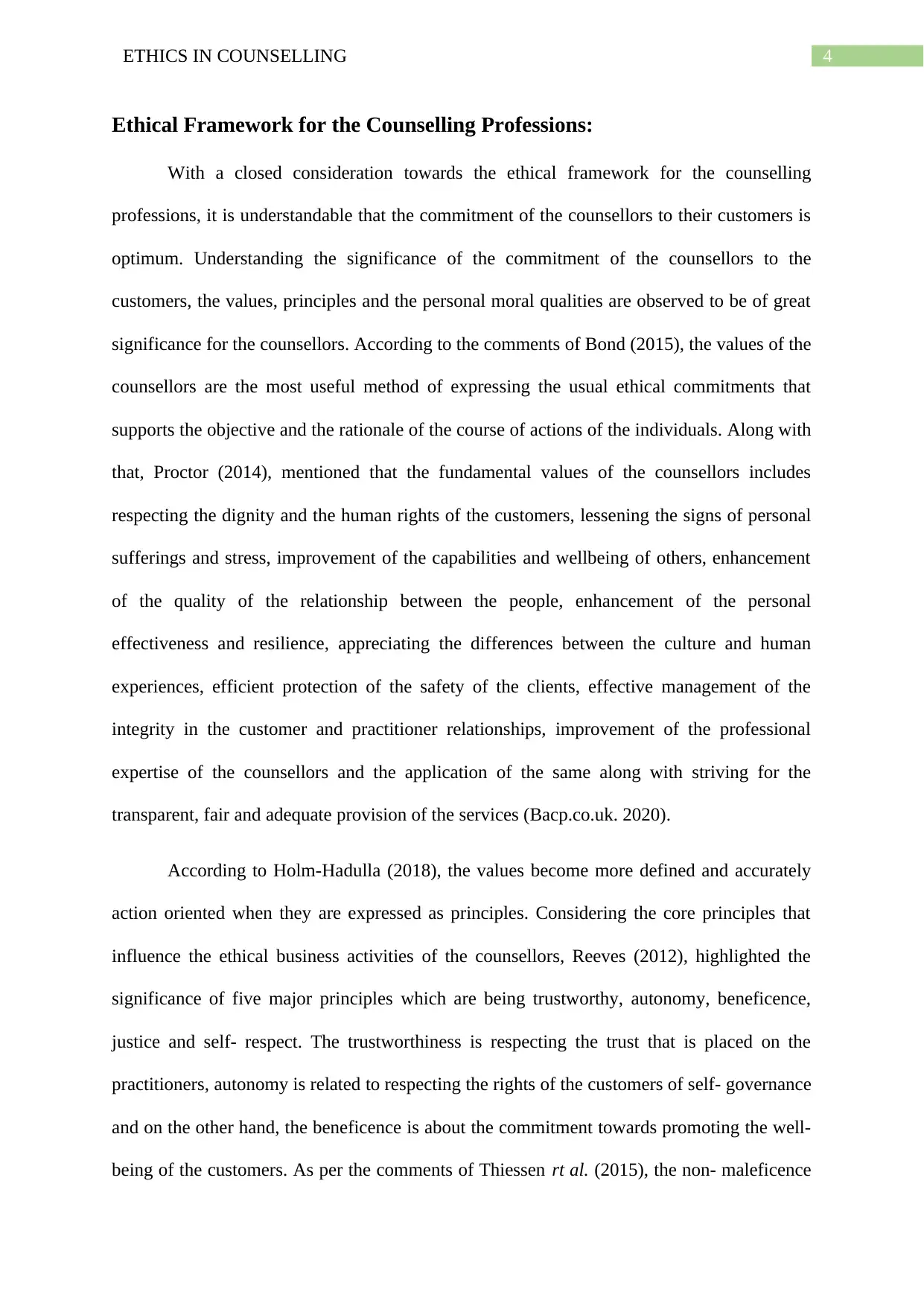
4ETHICS IN COUNSELLING
Ethical Framework for the Counselling Professions:
With a closed consideration towards the ethical framework for the counselling
professions, it is understandable that the commitment of the counsellors to their customers is
optimum. Understanding the significance of the commitment of the counsellors to the
customers, the values, principles and the personal moral qualities are observed to be of great
significance for the counsellors. According to the comments of Bond (2015), the values of the
counsellors are the most useful method of expressing the usual ethical commitments that
supports the objective and the rationale of the course of actions of the individuals. Along with
that, Proctor (2014), mentioned that the fundamental values of the counsellors includes
respecting the dignity and the human rights of the customers, lessening the signs of personal
sufferings and stress, improvement of the capabilities and wellbeing of others, enhancement
of the quality of the relationship between the people, enhancement of the personal
effectiveness and resilience, appreciating the differences between the culture and human
experiences, efficient protection of the safety of the clients, effective management of the
integrity in the customer and practitioner relationships, improvement of the professional
expertise of the counsellors and the application of the same along with striving for the
transparent, fair and adequate provision of the services (Bacp.co.uk. 2020).
According to Holm-Hadulla (2018), the values become more defined and accurately
action oriented when they are expressed as principles. Considering the core principles that
influence the ethical business activities of the counsellors, Reeves (2012), highlighted the
significance of five major principles which are being trustworthy, autonomy, beneficence,
justice and self- respect. The trustworthiness is respecting the trust that is placed on the
practitioners, autonomy is related to respecting the rights of the customers of self- governance
and on the other hand, the beneficence is about the commitment towards promoting the well-
being of the customers. As per the comments of Thiessen rt al. (2015), the non- maleficence
Ethical Framework for the Counselling Professions:
With a closed consideration towards the ethical framework for the counselling
professions, it is understandable that the commitment of the counsellors to their customers is
optimum. Understanding the significance of the commitment of the counsellors to the
customers, the values, principles and the personal moral qualities are observed to be of great
significance for the counsellors. According to the comments of Bond (2015), the values of the
counsellors are the most useful method of expressing the usual ethical commitments that
supports the objective and the rationale of the course of actions of the individuals. Along with
that, Proctor (2014), mentioned that the fundamental values of the counsellors includes
respecting the dignity and the human rights of the customers, lessening the signs of personal
sufferings and stress, improvement of the capabilities and wellbeing of others, enhancement
of the quality of the relationship between the people, enhancement of the personal
effectiveness and resilience, appreciating the differences between the culture and human
experiences, efficient protection of the safety of the clients, effective management of the
integrity in the customer and practitioner relationships, improvement of the professional
expertise of the counsellors and the application of the same along with striving for the
transparent, fair and adequate provision of the services (Bacp.co.uk. 2020).
According to Holm-Hadulla (2018), the values become more defined and accurately
action oriented when they are expressed as principles. Considering the core principles that
influence the ethical business activities of the counsellors, Reeves (2012), highlighted the
significance of five major principles which are being trustworthy, autonomy, beneficence,
justice and self- respect. The trustworthiness is respecting the trust that is placed on the
practitioners, autonomy is related to respecting the rights of the customers of self- governance
and on the other hand, the beneficence is about the commitment towards promoting the well-
being of the customers. As per the comments of Thiessen rt al. (2015), the non- maleficence
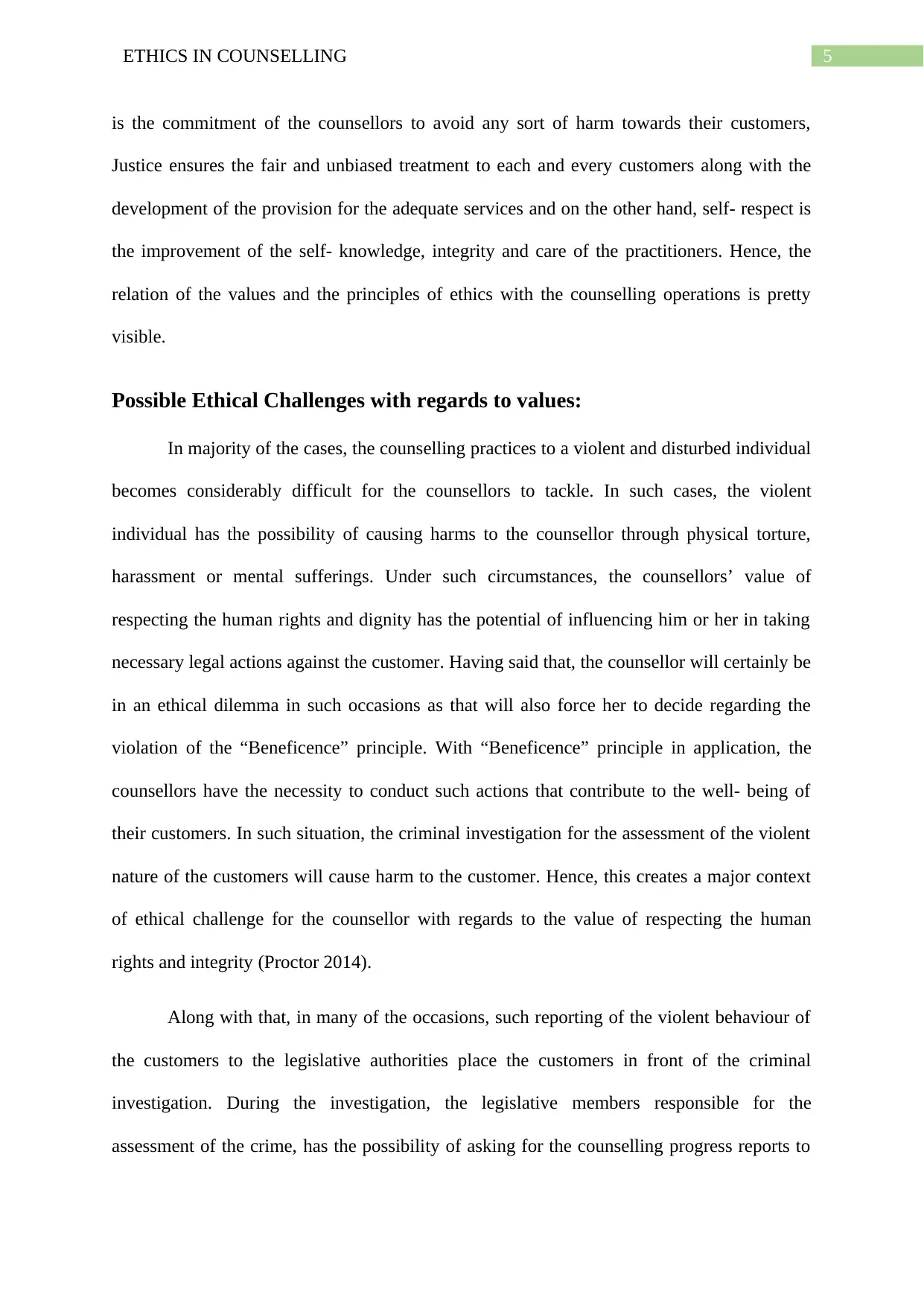
5ETHICS IN COUNSELLING
is the commitment of the counsellors to avoid any sort of harm towards their customers,
Justice ensures the fair and unbiased treatment to each and every customers along with the
development of the provision for the adequate services and on the other hand, self- respect is
the improvement of the self- knowledge, integrity and care of the practitioners. Hence, the
relation of the values and the principles of ethics with the counselling operations is pretty
visible.
Possible Ethical Challenges with regards to values:
In majority of the cases, the counselling practices to a violent and disturbed individual
becomes considerably difficult for the counsellors to tackle. In such cases, the violent
individual has the possibility of causing harms to the counsellor through physical torture,
harassment or mental sufferings. Under such circumstances, the counsellors’ value of
respecting the human rights and dignity has the potential of influencing him or her in taking
necessary legal actions against the customer. Having said that, the counsellor will certainly be
in an ethical dilemma in such occasions as that will also force her to decide regarding the
violation of the “Beneficence” principle. With “Beneficence” principle in application, the
counsellors have the necessity to conduct such actions that contribute to the well- being of
their customers. In such situation, the criminal investigation for the assessment of the violent
nature of the customers will cause harm to the customer. Hence, this creates a major context
of ethical challenge for the counsellor with regards to the value of respecting the human
rights and integrity (Proctor 2014).
Along with that, in many of the occasions, such reporting of the violent behaviour of
the customers to the legislative authorities place the customers in front of the criminal
investigation. During the investigation, the legislative members responsible for the
assessment of the crime, has the possibility of asking for the counselling progress reports to
is the commitment of the counsellors to avoid any sort of harm towards their customers,
Justice ensures the fair and unbiased treatment to each and every customers along with the
development of the provision for the adequate services and on the other hand, self- respect is
the improvement of the self- knowledge, integrity and care of the practitioners. Hence, the
relation of the values and the principles of ethics with the counselling operations is pretty
visible.
Possible Ethical Challenges with regards to values:
In majority of the cases, the counselling practices to a violent and disturbed individual
becomes considerably difficult for the counsellors to tackle. In such cases, the violent
individual has the possibility of causing harms to the counsellor through physical torture,
harassment or mental sufferings. Under such circumstances, the counsellors’ value of
respecting the human rights and dignity has the potential of influencing him or her in taking
necessary legal actions against the customer. Having said that, the counsellor will certainly be
in an ethical dilemma in such occasions as that will also force her to decide regarding the
violation of the “Beneficence” principle. With “Beneficence” principle in application, the
counsellors have the necessity to conduct such actions that contribute to the well- being of
their customers. In such situation, the criminal investigation for the assessment of the violent
nature of the customers will cause harm to the customer. Hence, this creates a major context
of ethical challenge for the counsellor with regards to the value of respecting the human
rights and integrity (Proctor 2014).
Along with that, in many of the occasions, such reporting of the violent behaviour of
the customers to the legislative authorities place the customers in front of the criminal
investigation. During the investigation, the legislative members responsible for the
assessment of the crime, has the possibility of asking for the counselling progress reports to
⊘ This is a preview!⊘
Do you want full access?
Subscribe today to unlock all pages.

Trusted by 1+ million students worldwide
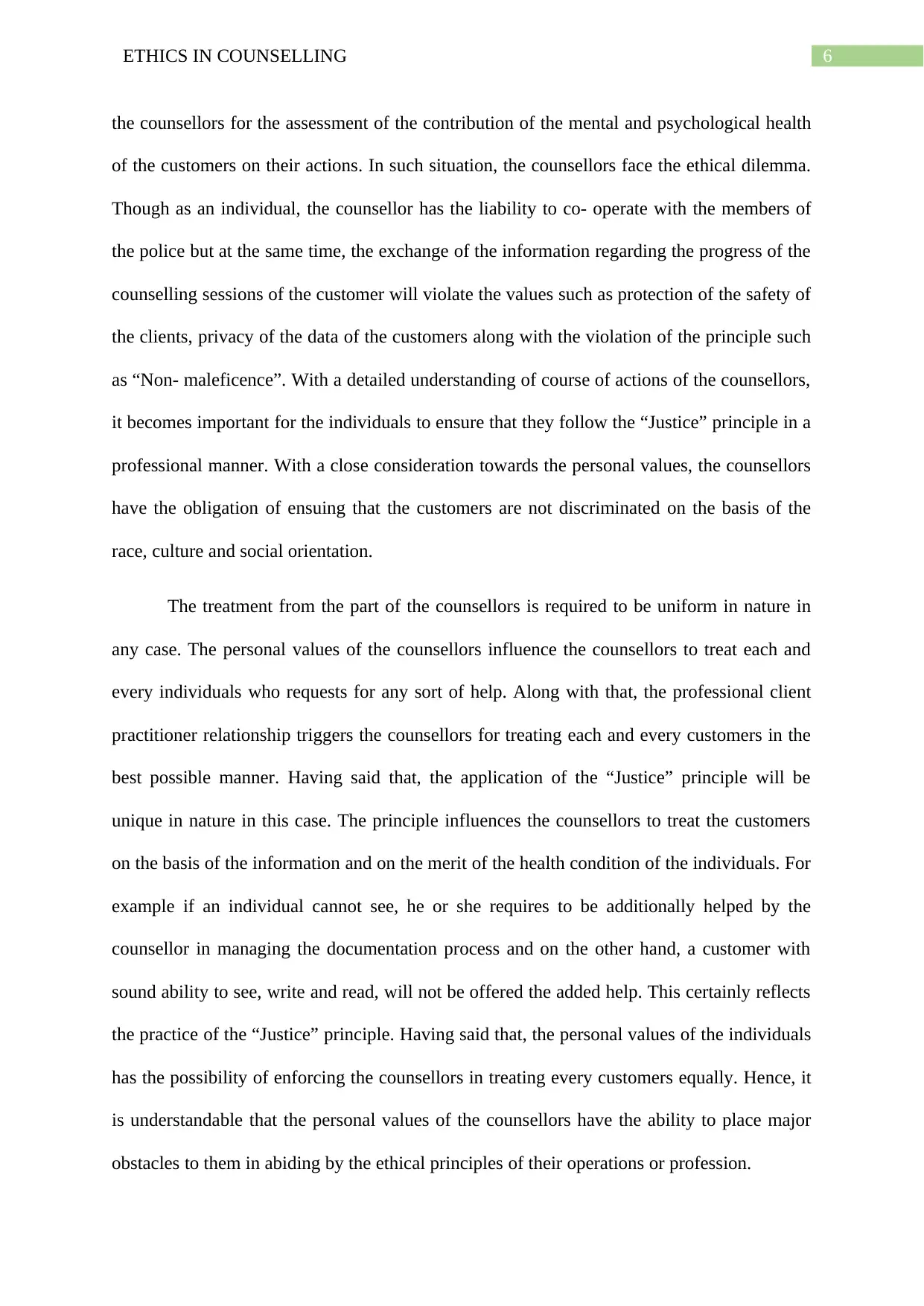
6ETHICS IN COUNSELLING
the counsellors for the assessment of the contribution of the mental and psychological health
of the customers on their actions. In such situation, the counsellors face the ethical dilemma.
Though as an individual, the counsellor has the liability to co- operate with the members of
the police but at the same time, the exchange of the information regarding the progress of the
counselling sessions of the customer will violate the values such as protection of the safety of
the clients, privacy of the data of the customers along with the violation of the principle such
as “Non- maleficence”. With a detailed understanding of course of actions of the counsellors,
it becomes important for the individuals to ensure that they follow the “Justice” principle in a
professional manner. With a close consideration towards the personal values, the counsellors
have the obligation of ensuing that the customers are not discriminated on the basis of the
race, culture and social orientation.
The treatment from the part of the counsellors is required to be uniform in nature in
any case. The personal values of the counsellors influence the counsellors to treat each and
every individuals who requests for any sort of help. Along with that, the professional client
practitioner relationship triggers the counsellors for treating each and every customers in the
best possible manner. Having said that, the application of the “Justice” principle will be
unique in nature in this case. The principle influences the counsellors to treat the customers
on the basis of the information and on the merit of the health condition of the individuals. For
example if an individual cannot see, he or she requires to be additionally helped by the
counsellor in managing the documentation process and on the other hand, a customer with
sound ability to see, write and read, will not be offered the added help. This certainly reflects
the practice of the “Justice” principle. Having said that, the personal values of the individuals
has the possibility of enforcing the counsellors in treating every customers equally. Hence, it
is understandable that the personal values of the counsellors have the ability to place major
obstacles to them in abiding by the ethical principles of their operations or profession.
the counsellors for the assessment of the contribution of the mental and psychological health
of the customers on their actions. In such situation, the counsellors face the ethical dilemma.
Though as an individual, the counsellor has the liability to co- operate with the members of
the police but at the same time, the exchange of the information regarding the progress of the
counselling sessions of the customer will violate the values such as protection of the safety of
the clients, privacy of the data of the customers along with the violation of the principle such
as “Non- maleficence”. With a detailed understanding of course of actions of the counsellors,
it becomes important for the individuals to ensure that they follow the “Justice” principle in a
professional manner. With a close consideration towards the personal values, the counsellors
have the obligation of ensuing that the customers are not discriminated on the basis of the
race, culture and social orientation.
The treatment from the part of the counsellors is required to be uniform in nature in
any case. The personal values of the counsellors influence the counsellors to treat each and
every individuals who requests for any sort of help. Along with that, the professional client
practitioner relationship triggers the counsellors for treating each and every customers in the
best possible manner. Having said that, the application of the “Justice” principle will be
unique in nature in this case. The principle influences the counsellors to treat the customers
on the basis of the information and on the merit of the health condition of the individuals. For
example if an individual cannot see, he or she requires to be additionally helped by the
counsellor in managing the documentation process and on the other hand, a customer with
sound ability to see, write and read, will not be offered the added help. This certainly reflects
the practice of the “Justice” principle. Having said that, the personal values of the individuals
has the possibility of enforcing the counsellors in treating every customers equally. Hence, it
is understandable that the personal values of the counsellors have the ability to place major
obstacles to them in abiding by the ethical principles of their operations or profession.
Paraphrase This Document
Need a fresh take? Get an instant paraphrase of this document with our AI Paraphraser
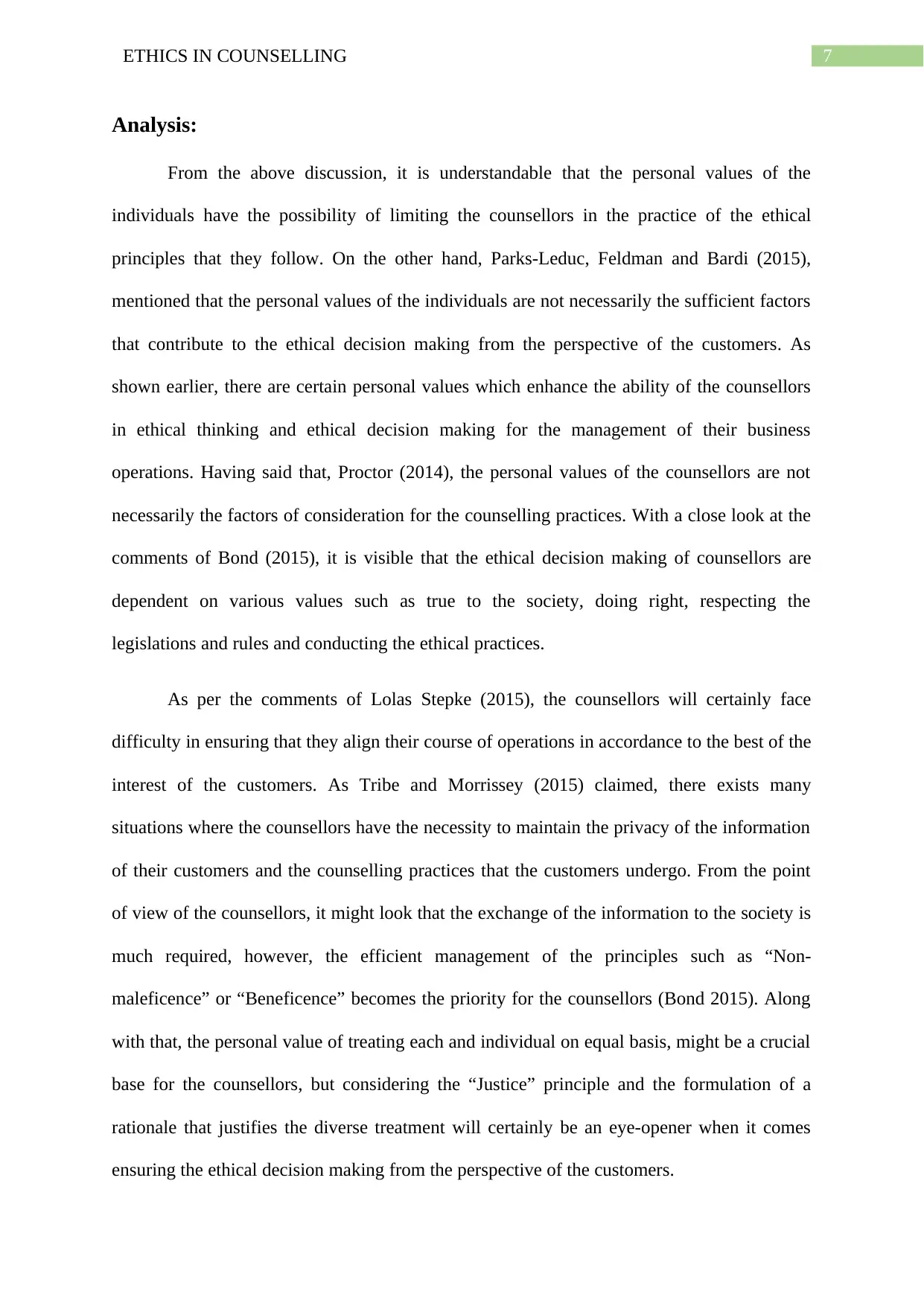
7ETHICS IN COUNSELLING
Analysis:
From the above discussion, it is understandable that the personal values of the
individuals have the possibility of limiting the counsellors in the practice of the ethical
principles that they follow. On the other hand, Parks-Leduc, Feldman and Bardi (2015),
mentioned that the personal values of the individuals are not necessarily the sufficient factors
that contribute to the ethical decision making from the perspective of the customers. As
shown earlier, there are certain personal values which enhance the ability of the counsellors
in ethical thinking and ethical decision making for the management of their business
operations. Having said that, Proctor (2014), the personal values of the counsellors are not
necessarily the factors of consideration for the counselling practices. With a close look at the
comments of Bond (2015), it is visible that the ethical decision making of counsellors are
dependent on various values such as true to the society, doing right, respecting the
legislations and rules and conducting the ethical practices.
As per the comments of Lolas Stepke (2015), the counsellors will certainly face
difficulty in ensuring that they align their course of operations in accordance to the best of the
interest of the customers. As Tribe and Morrissey (2015) claimed, there exists many
situations where the counsellors have the necessity to maintain the privacy of the information
of their customers and the counselling practices that the customers undergo. From the point
of view of the counsellors, it might look that the exchange of the information to the society is
much required, however, the efficient management of the principles such as “Non-
maleficence” or “Beneficence” becomes the priority for the counsellors (Bond 2015). Along
with that, the personal value of treating each and individual on equal basis, might be a crucial
base for the counsellors, but considering the “Justice” principle and the formulation of a
rationale that justifies the diverse treatment will certainly be an eye-opener when it comes
ensuring the ethical decision making from the perspective of the customers.
Analysis:
From the above discussion, it is understandable that the personal values of the
individuals have the possibility of limiting the counsellors in the practice of the ethical
principles that they follow. On the other hand, Parks-Leduc, Feldman and Bardi (2015),
mentioned that the personal values of the individuals are not necessarily the sufficient factors
that contribute to the ethical decision making from the perspective of the customers. As
shown earlier, there are certain personal values which enhance the ability of the counsellors
in ethical thinking and ethical decision making for the management of their business
operations. Having said that, Proctor (2014), the personal values of the counsellors are not
necessarily the factors of consideration for the counselling practices. With a close look at the
comments of Bond (2015), it is visible that the ethical decision making of counsellors are
dependent on various values such as true to the society, doing right, respecting the
legislations and rules and conducting the ethical practices.
As per the comments of Lolas Stepke (2015), the counsellors will certainly face
difficulty in ensuring that they align their course of operations in accordance to the best of the
interest of the customers. As Tribe and Morrissey (2015) claimed, there exists many
situations where the counsellors have the necessity to maintain the privacy of the information
of their customers and the counselling practices that the customers undergo. From the point
of view of the counsellors, it might look that the exchange of the information to the society is
much required, however, the efficient management of the principles such as “Non-
maleficence” or “Beneficence” becomes the priority for the counsellors (Bond 2015). Along
with that, the personal value of treating each and individual on equal basis, might be a crucial
base for the counsellors, but considering the “Justice” principle and the formulation of a
rationale that justifies the diverse treatment will certainly be an eye-opener when it comes
ensuring the ethical decision making from the perspective of the customers.
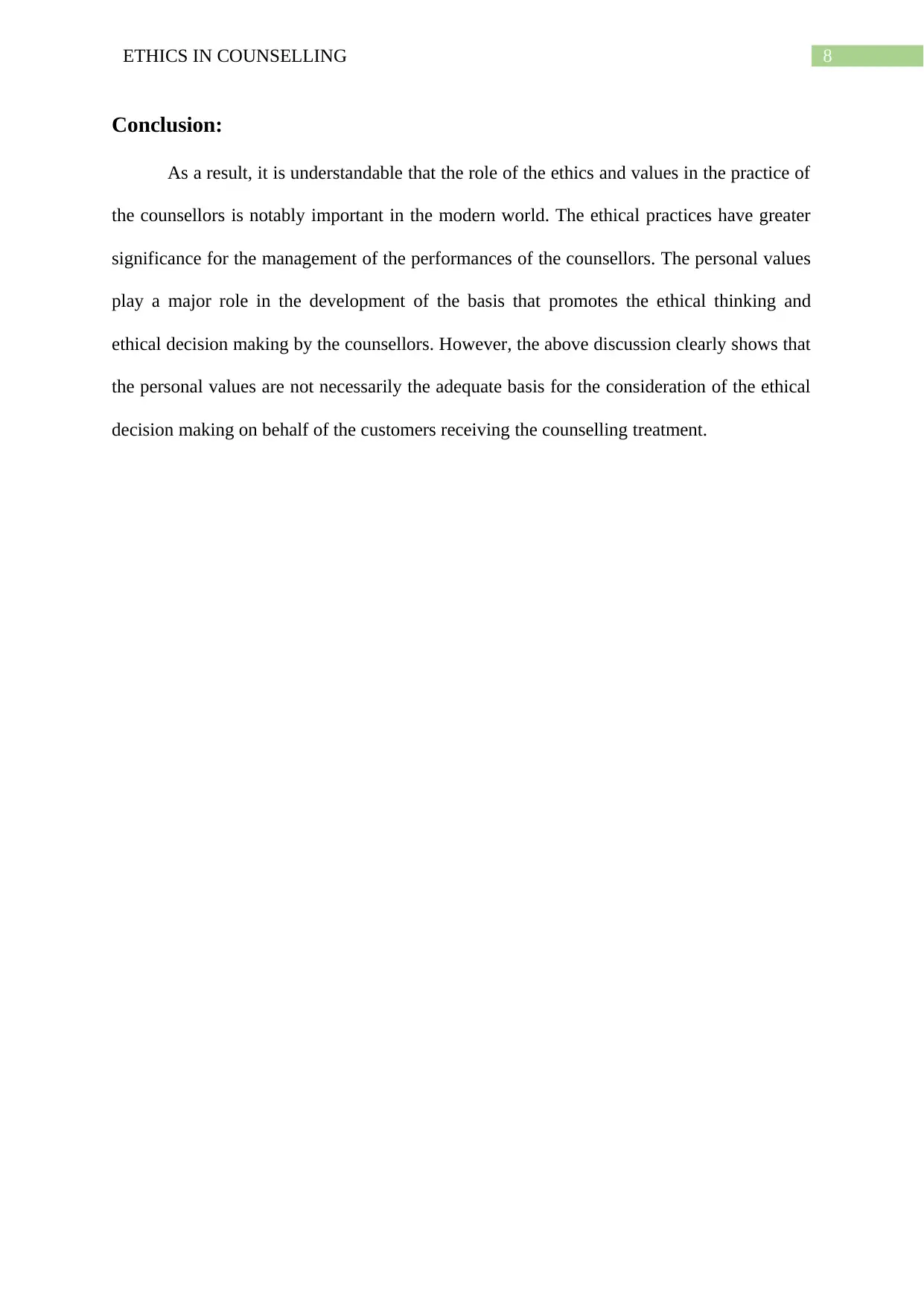
8ETHICS IN COUNSELLING
Conclusion:
As a result, it is understandable that the role of the ethics and values in the practice of
the counsellors is notably important in the modern world. The ethical practices have greater
significance for the management of the performances of the counsellors. The personal values
play a major role in the development of the basis that promotes the ethical thinking and
ethical decision making by the counsellors. However, the above discussion clearly shows that
the personal values are not necessarily the adequate basis for the consideration of the ethical
decision making on behalf of the customers receiving the counselling treatment.
Conclusion:
As a result, it is understandable that the role of the ethics and values in the practice of
the counsellors is notably important in the modern world. The ethical practices have greater
significance for the management of the performances of the counsellors. The personal values
play a major role in the development of the basis that promotes the ethical thinking and
ethical decision making by the counsellors. However, the above discussion clearly shows that
the personal values are not necessarily the adequate basis for the consideration of the ethical
decision making on behalf of the customers receiving the counselling treatment.
⊘ This is a preview!⊘
Do you want full access?
Subscribe today to unlock all pages.

Trusted by 1+ million students worldwide
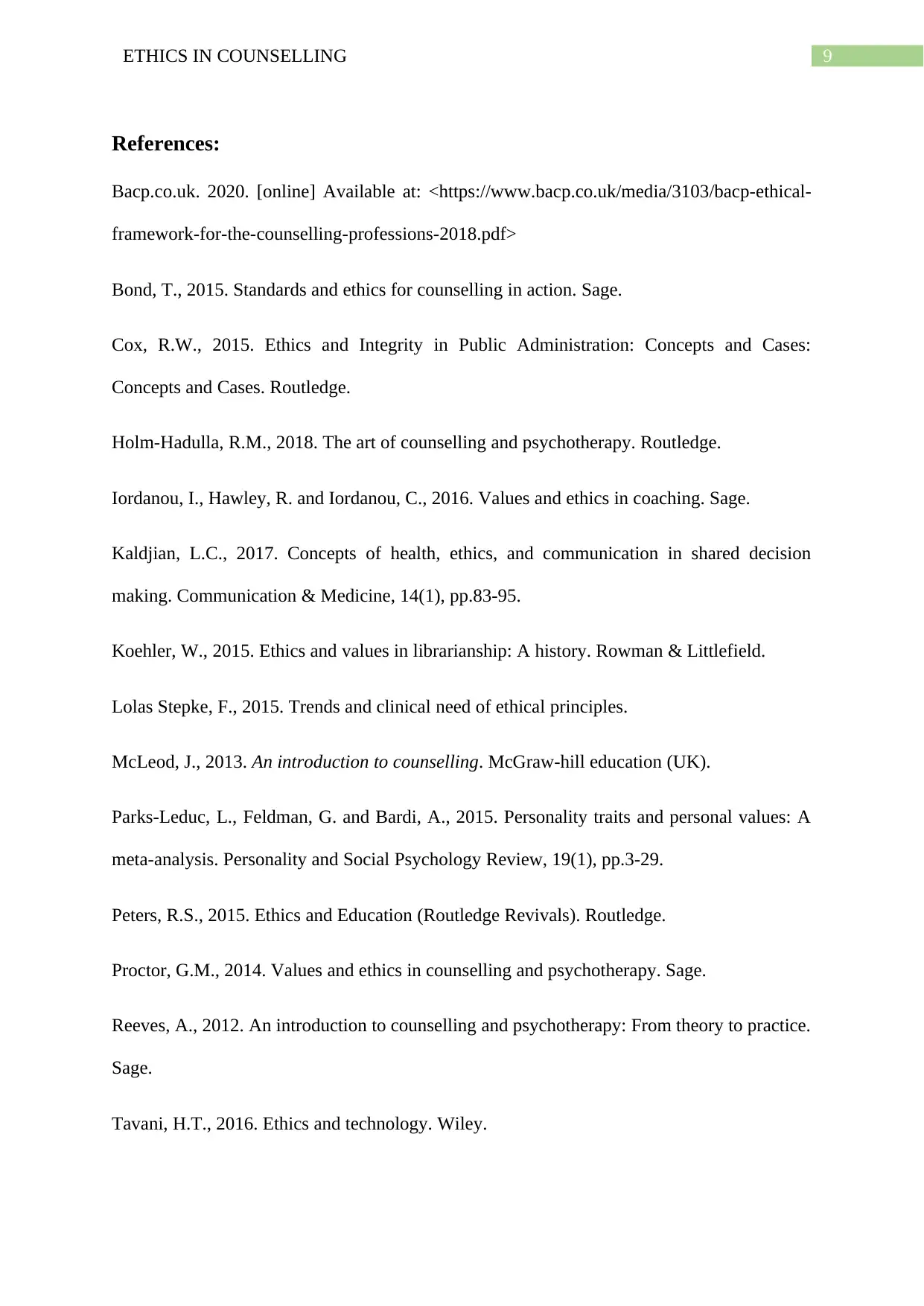
9ETHICS IN COUNSELLING
References:
Bacp.co.uk. 2020. [online] Available at: <https://www.bacp.co.uk/media/3103/bacp-ethical-
framework-for-the-counselling-professions-2018.pdf>
Bond, T., 2015. Standards and ethics for counselling in action. Sage.
Cox, R.W., 2015. Ethics and Integrity in Public Administration: Concepts and Cases:
Concepts and Cases. Routledge.
Holm-Hadulla, R.M., 2018. The art of counselling and psychotherapy. Routledge.
Iordanou, I., Hawley, R. and Iordanou, C., 2016. Values and ethics in coaching. Sage.
Kaldjian, L.C., 2017. Concepts of health, ethics, and communication in shared decision
making. Communication & Medicine, 14(1), pp.83-95.
Koehler, W., 2015. Ethics and values in librarianship: A history. Rowman & Littlefield.
Lolas Stepke, F., 2015. Trends and clinical need of ethical principles.
McLeod, J., 2013. An introduction to counselling. McGraw-hill education (UK).
Parks-Leduc, L., Feldman, G. and Bardi, A., 2015. Personality traits and personal values: A
meta-analysis. Personality and Social Psychology Review, 19(1), pp.3-29.
Peters, R.S., 2015. Ethics and Education (Routledge Revivals). Routledge.
Proctor, G.M., 2014. Values and ethics in counselling and psychotherapy. Sage.
Reeves, A., 2012. An introduction to counselling and psychotherapy: From theory to practice.
Sage.
Tavani, H.T., 2016. Ethics and technology. Wiley.
References:
Bacp.co.uk. 2020. [online] Available at: <https://www.bacp.co.uk/media/3103/bacp-ethical-
framework-for-the-counselling-professions-2018.pdf>
Bond, T., 2015. Standards and ethics for counselling in action. Sage.
Cox, R.W., 2015. Ethics and Integrity in Public Administration: Concepts and Cases:
Concepts and Cases. Routledge.
Holm-Hadulla, R.M., 2018. The art of counselling and psychotherapy. Routledge.
Iordanou, I., Hawley, R. and Iordanou, C., 2016. Values and ethics in coaching. Sage.
Kaldjian, L.C., 2017. Concepts of health, ethics, and communication in shared decision
making. Communication & Medicine, 14(1), pp.83-95.
Koehler, W., 2015. Ethics and values in librarianship: A history. Rowman & Littlefield.
Lolas Stepke, F., 2015. Trends and clinical need of ethical principles.
McLeod, J., 2013. An introduction to counselling. McGraw-hill education (UK).
Parks-Leduc, L., Feldman, G. and Bardi, A., 2015. Personality traits and personal values: A
meta-analysis. Personality and Social Psychology Review, 19(1), pp.3-29.
Peters, R.S., 2015. Ethics and Education (Routledge Revivals). Routledge.
Proctor, G.M., 2014. Values and ethics in counselling and psychotherapy. Sage.
Reeves, A., 2012. An introduction to counselling and psychotherapy: From theory to practice.
Sage.
Tavani, H.T., 2016. Ethics and technology. Wiley.
Paraphrase This Document
Need a fresh take? Get an instant paraphrase of this document with our AI Paraphraser
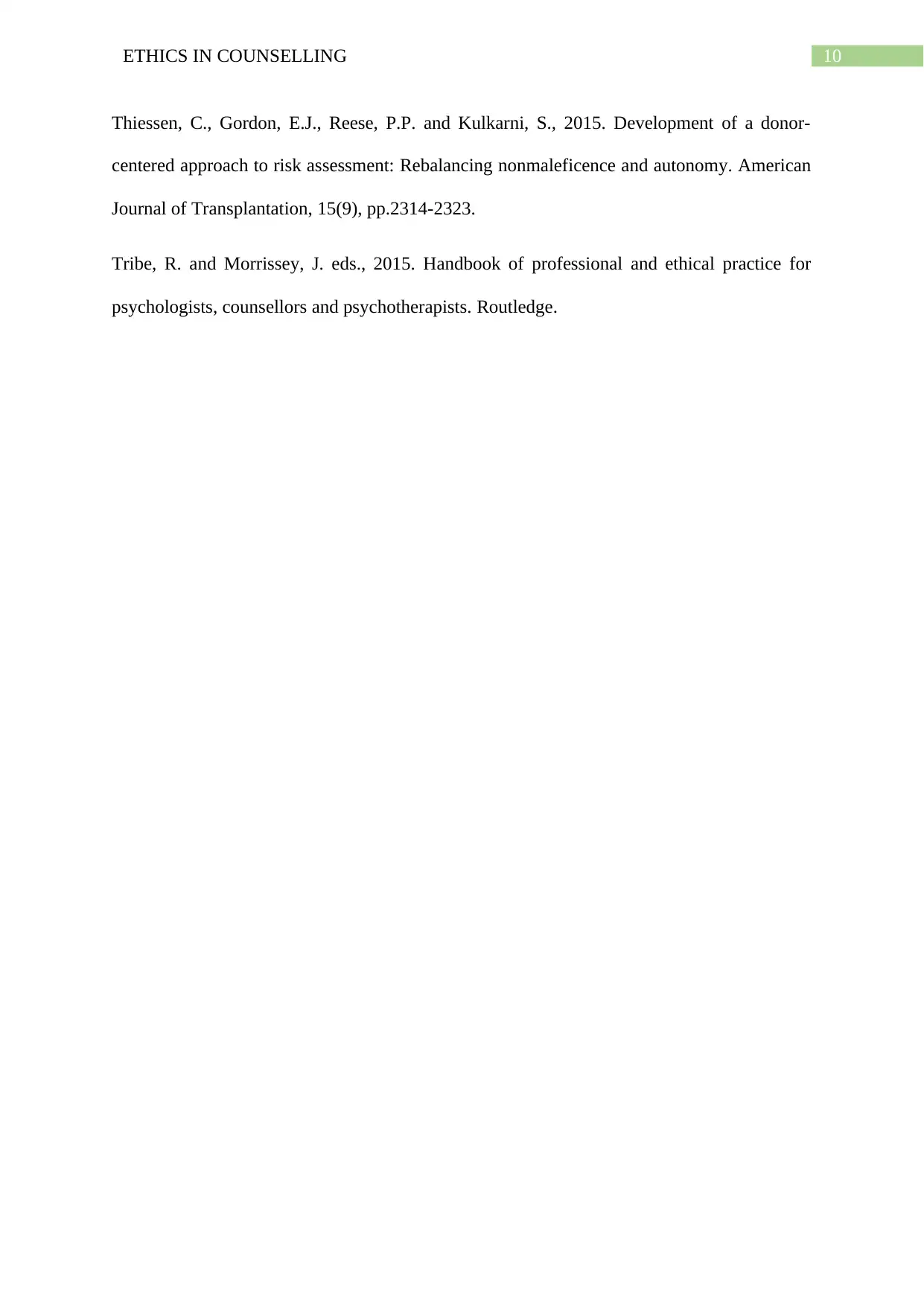
10ETHICS IN COUNSELLING
Thiessen, C., Gordon, E.J., Reese, P.P. and Kulkarni, S., 2015. Development of a donor‐
centered approach to risk assessment: Rebalancing nonmaleficence and autonomy. American
Journal of Transplantation, 15(9), pp.2314-2323.
Tribe, R. and Morrissey, J. eds., 2015. Handbook of professional and ethical practice for
psychologists, counsellors and psychotherapists. Routledge.
Thiessen, C., Gordon, E.J., Reese, P.P. and Kulkarni, S., 2015. Development of a donor‐
centered approach to risk assessment: Rebalancing nonmaleficence and autonomy. American
Journal of Transplantation, 15(9), pp.2314-2323.
Tribe, R. and Morrissey, J. eds., 2015. Handbook of professional and ethical practice for
psychologists, counsellors and psychotherapists. Routledge.
1 out of 11
Related Documents
Your All-in-One AI-Powered Toolkit for Academic Success.
+13062052269
info@desklib.com
Available 24*7 on WhatsApp / Email
![[object Object]](/_next/static/media/star-bottom.7253800d.svg)
Unlock your academic potential
Copyright © 2020–2025 A2Z Services. All Rights Reserved. Developed and managed by ZUCOL.





